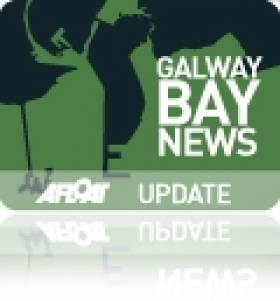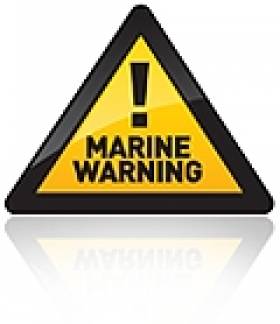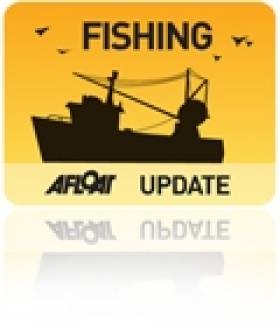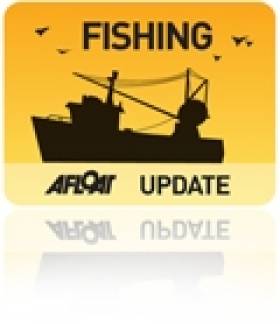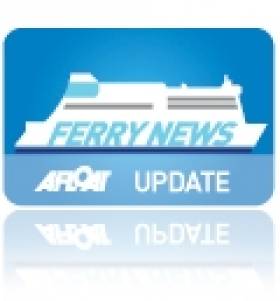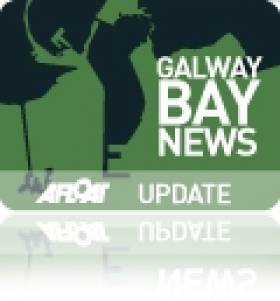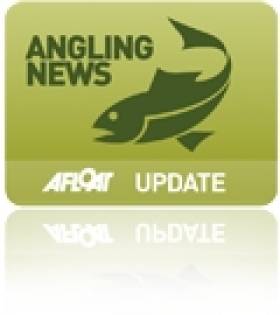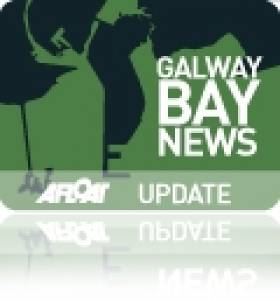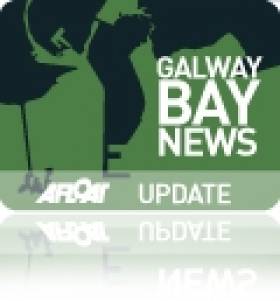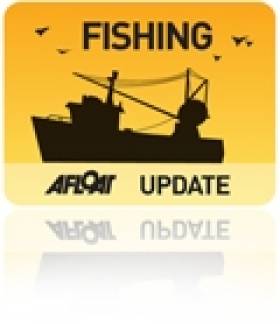Displaying items by tag: Galway Bay
Search For Galway Man Extends To Coastal Areas
#GalwayBay - Galway Bay FM reports that the search for a missing Galway man has been expanded to a coastal search.
Tom Ward, 39, was last seen in Galway city centre on 7 February, and was reported missing by his family 10 days later.
Gardaí stepped up their search to the shoreline areas of Galway Bay adjoining the city earlier this week, enlisting Civil Defence volunteers to search as far as Kinvara in the south-east corner of the bay.
Marine Notice: Hydrographic Survey in Galway Bay
#MarineNotice - The latest Marine Notice from the DTTAS advises all seafarers off the West of Ireland that a hydrographic and geophysical survey operation will be carried out in Galway Bay from today Friday 22 February till Tuesday 26 February as part of the INFOMAR programme.
The RV Celtic Voyager (Call sign EIQN) is expected to carry out the survey operations. The vessel will be towing different senors from time to time with a cable of up to 150m in length for magnetometer and sidescan sonar.
The vessel will display appropriate lights and markers, and will be listening on VHF CH 16 throughout the project.
Full details, including co-ordinates, are included in Marine Notice No 08 of 2013, a PDF of which is available to read or download HERE.
IFI Welcomes New Research On Sea Lice and Wild Salmon
#FishFarm - Inland Fisheries Ireland has welcomed "a clear acceptance of the impact of sea lice on juvenile salmon" following a recent Marine Institute publication that identifies the effect of sea lice emanating from aquaculture facilities on wild Atlantic salmon mortality.
According to IFI, the paper published in the Journal of Fish Diseases "concurs with previously published international research" that it says establishes an incontrovertible link between fish farm developments and negative effects on local wild salmon numbers, as previously reported on Afloat.ie.
It adds that "the debate can now progress to identify the best methodologies to reduce or eliminate this impact" as well as moves on "the issue of escaped farmed salmon".
In a statement on the new paper, IFI says the research "identified that just under 40% of released juvenile salmon showed a significant difference in return rate between sea lice ‘treated’ and ‘non-treated’ groups, indicating that mortality from sea lice is significant in 40% of the releases in the study. Unfortunately, there was a significant effect from sea lice in six different bays along the west coast over the study period.
"This recent study provides further evidence that salmon will be impacted by sea lice. The location of salmon farms in relation to salmon rivers and the control of sea lice prior to and during juveniles salmon migration to their high seas feeding ground is critical if wild salmon stocks are not to be impacted.
"The development of resistance to chemical treatment of sea lice and other fish husbandry problems, such as pancreas disease and amoebic gill disease, are likely to make effective sea lice control even more difficult in future years."
IFI also highlights the Norwegian government's concerns about the impact of sea lice and escaped farm salmon on wild salmon stocks.
The statutory body for the protection and conservation for Ireland's inland fisheries reiterated its support for "the development of a sustainable aquaculture industry" to "safeguard wild salmon and sea trout stocks into the future".
It adds that recommendations on the above issues have been made in its submission to the Department of the Marine on the Environmental Impact Statement regarding the proposed deep-sea organic salmon farm in Galway Bay, a scheme that has been the subject of controversy over recent months.
Morning Ireland Reports On Galway Bay Fish Farm Debate
#FishFarm - RTÉ Radio 1's Morning Ireland reports on last night's public meeting in Galway on the proposed deep sea fish farm in Galway Bay.
As previously reported on Afloat.ie, the 500-hectare organic salmon farm proposed by Bord Iascaigh Mhara (BIM) would be located off Inis Oírr in the Aran Islands, and would be the largest of its kind in Europe, set to double the State's production rate of organic salmon.
BIM's aquaculture development manager Donal McGuire moved to reassure concerned locals that the agency was "not about to damage [its] reputation" by "doing something foolish or doing something that will cause serious environmental damage".
McGuire added that organic salmon is Ireland's leading organic food export but is in "very very short supply", and that business would be lost to producers in Scotland and Norway.
However, the scheme has faced strong opposition from fisheries groups and local anglers citing the potential environmental impact on wild salmon numbers and the threat to tourism in the area.
At last night's meeting, RTE's western correspondent Pat McGrath says just two of the more than 100 in attendance spoke in support of the fish farm plans.
Another public meeting on the proposals is scheduled for tonight in Rossaveal.
BIM is expected to hold a public tender process for the proposed salmon farm project pending approval by Marine Minister Simon Coveney.
Steep Rise Set for Aran Islands Ferry Fares
#Ferries - Ferry fares for people travelling between Inis Mór in the Aran Islands and the mainland are set to almost double from tomorrow 1 February, as RTÉ News reports.
Island Ferries founder Paddy O'Brien has cited increased fuel costs for the sharp fare rise from €8 to €15 for return trips from the largest island in the group in Galway Bay.
Fares for residents of Inis Oírr and Inis Meáin are also rising by 25% after an increase in the annual subvention to provide ferry services to the islands sought by Island Ferries was not accepted by the Department of Arts, Heritage and the Gaeltacht.
The department had failed to secure any tenders for a public service contract on the Aran Islands ferry service, the present contracts for which expire today.
Post-Mortem Scheduled for Body Recovered from Galway Bay
#GalwayBay - A post-mortem was scheduled for today (25 January) to determine the cause of the death of a man recovered from Galway Bay yesterday, according to the Irish Examiner.
As Galway Bay FM reported yesterday, the body was taken from the sea off Barna in a search operation mounted by the Galway RNLI lifeboat and the Irish Coast Guard after a friend reported him missing.
The man has last been seen on Barna beach earlier in the day. His body was recovered some two miles out to sea around 2.30pm yesterday.
Gardaí at Salthill are investigating the incident.
IFI Repeats Concerns Over Aran Islands Fish Farm
#Angling - Anglers on the River Feale in Kerry and Limerick have been assured by Inland Fisheries Ireland (IFI) that it supports their concerns over the proposed deep-sea fish farm in Galway Bay, as the Limerick Leader reports.
Local anglers are among those throughout the region who have rallied in opposition to plans for the Aran Islands fish farm project, over fears that it would lead to “an explosion” in parasitic sea lice which would prey on wild inland salmon from Irish rivers feeding in the North Atlantic.
IFI reiterated its statement issued last month in which its board said it does not believe "that the corpus of peer reviewed international scientific literature which recognises the negative impacts of sea lice on salmonids have been adequately dealt with" in the Environmental Impact Statement prepared by Bord Iascaigh Mhara (BIM) as part of the public consultation process.
A spokesperson for IFI told the Limerick Leader that the authority has "major concerns about the location and scale [of the farm], as well as its potential impact on sea life. [IFI] is not supporting it in its current form.”
Earlier this month the National Inland Fisheries Forum also criticised as "flawed" the consent process regarding the 15,000-tonne organic salmon farm planned off Inis Oirr, which would be the largest of its kind in Europe.
If approved, the operation could more than double Ireland's current production rate of farmed salmon.
The Limerick Leader has much more on the story HERE.
Fisheries Forum Lambasts Minister Over Galway Bay Fish Farm Decision Process
#FishFarm - The National Inland Fisheries Forum (NIFF) has criticised as "flawed" the consent process regarding the proposed deep-sea fish farm in Galway Bay which has stirred much controversy in recent weeks.
In a letter to the Department of Agriculture, Food and the Marine as part of the public consultation process, NIFF chair Derek Davis writes that the forum "considers the consent process to be flawed" as a result of "the decision making function being exercised by the Minister for Agriculture, Fisheries and Food" in a number of circumstances, including where:
- the applicant - Bord Iascaigh Mhara (BIM) - "has several appointees of the said minister at board level";
- the State fisheries board "receives funding and policy directions from the minister's department";
- public announcements made on the proposals and related concerns "indicate pre-judging of the issues";
- any appeal following the minister's decision "would be dealt with by appointees of the minister"; and where
- the "specific statutory basis" on which BIM authorises aquaculture operations "has not been adequately set out".
The letter reiterates Inland Fisheries Ireland's (IFI) criticisms of the Environmental Impact Statement (EIS) carried out on the proposed location of the 15,000-tonne organic salmon farm off the Aran Islands, stating the NIFF's believe that the document "is deficient in a number of areas" such as not adequately addressing wild salmon migration routes, and making presumptions on the potential impact of sea lice and escaped farmed salmon on adjacent fisheries.
The forum also has concerns regarding the public consultation itself, noting that requests for "specific scientific information used to underpin statements in the EIS" have not been followed through.
"The forum believes that on the basis of the information supplied, the minister is not in a position to make a positive decision on this application," writes Davis. "To do so would represent a failure to adhere to the precautionary principle" which applies "where there is uncertainty as to the existence or extent of risks".
The letter in full is available as a PDF to download HERE.
Groups To Protest Marine Minister's Office Over Galway Bay Salmon Farm
#FishFarm - A group opposed to the Galway Bay deep-sea salmon farm proposals has announced it will protest the constituency office of Marine Minister Simon Coveney this Saturday 15 December.
In a statement to the media, No Salmon Farms At Sea (NSFAS) said that it will join likeminded groups Save Bantry Bay, Save Galway Bay, FISSTA and Friends of the Irish Environment, along with other local and national organisations, in a protest march through Carrigaline, Co Cork to Minister Coveney's office in the town, where invited speakers will address the crowd to express their opposition to the fish farm.
As previously reported on Afloat.ie, the 15,000-tonne deep-sea organic salmon farm would be located on a 500-hectare site in Galway Bay off Inis Oirr in the Aran Islands, and would be one of the largest projects of its kind in Europe, projected to be worth more than €100 million annually for the economy, according to Bord Iascaigh Mhara (BIM).
But the proposals have raised the ire of local anglers and conservationists who fear the development could have a negative impact on wild salmon numbers in the area.
"Minister Coveney has been a strong supporter of the aquaculture industry and we intend to let him know that his support is misguided and will result in catastrophe not only for our stocks of wild atlantic salmon and sea trout, but also for the communities and local businesses that depend on their very existence," said NSFAS.
The statement also cited the recent international study involving experts from Inland Fisheries Ireland which concluded that 39% of all young salmon mortalities are directly attributable to sea lice in areas where salmon farming takes place.
It added: "The highly inflated number of jobs, which BIM claim will be created, will be far outweighed by the number of jobs lost in areas where no other industry exists apart from that in tourism...
We have a world class sport fishery here in Ireland and our outwardly projected clean environment is one of our greatest assets. However it is fragile and will be destroyed if the salmon farming industry is developed further.
"Anglers and conservationists will do everything in their power to prevent any further destruction to our environment and already declining wild salmon and sea trout stocks."
Meanwhile, in today's Irish Times, angling correspondent Derek Evans writes that "anglers, stakeholders, hoteliers, restaurateurs, islanders and west coast citizens are 'up in arms' and rallying in large numbers in opposition" to what he describes as "this outrageous proposal".
He also backtracked on his previous claim about the location of the deep-sea farm as "a step in the right direction", explaining that he was contacted by a man living on Inis Oirr who said the location for the new fish farm is just "one land mile" opposite the beach, posing a threat to its tourism assets.
The Irish Times has much more on the story HERE.
BIM to Hold Public Tender for Galway Bay Fish Farm
#FISHFARM - Bord Iascaigh Mhara (BIM) is set to hold a public tender process for the development of the proposed deep sea fish farm in Galway Bay, according to The Irish Times.
Financiers around the world have expressed interest in the 500-hectare organic salmon farm to be located off Inis Oirr in the Aran Islands, though BIM said it was not at liberty to disclose who they are.
As previously reported on Afloat.ie, the proposed fish farm would be the largest of its kind in Europe, set to double the State's production of organic salmon.
BIM says it is already receiving inquiries for jobs from emigrants wishing to return home.
However the scheme has faced opposition from Inland Fisheries Ireland (IFI) and local anglers, who cite the potential threat to wild salmon numbers in the area.
IFI recently issued a statement regarding its submission on the project's Environmental Impact Statement, raising concerns about the scale of the development and the impact of sea lice - infestations of which are often concentrated by aquaculture.
The public consultation that began in mid-October is scheduled to conclude next Wednesday 12 December.



























